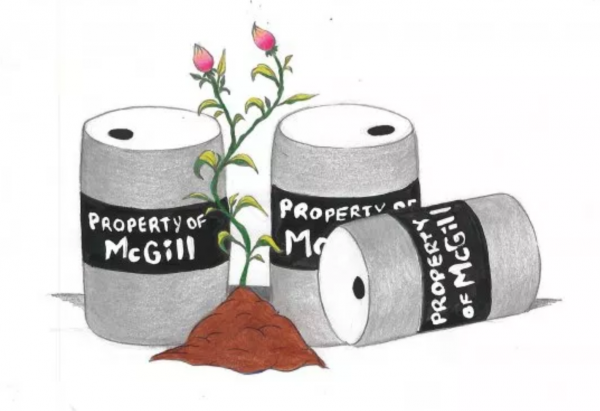On Sept. 12, the McGill Senate voted to support divestment from fossil fuels. While the term ‘divestment’ is ubiquitous on McGill’s campus, its meaning and implications remain foggy to many.
To maintain financial stability, the Senate reports that McGill invests part of its $1.6 billion endowment into fossil fuel firms. Divestment, as it pertains to fossil fuels at McGill, is the act of selling stocks in companies that make profit off of fossil fuels to convey the institution’s social and environmental responsibility.
Scientists almost unanimously agree that fossil fuels are the main cause of global warming. Fossil fuels are burned for energy, which releases carbon dioxide into the atmosphere. As a greenhouse gas, carbon dioxide molecules trap heat from the sun in Earth’s atmosphere much like the walls of a greenhouse retain heat. As a result of an increased consumption of fossil fuels to power everyday life, the Earth has become almost 1ºC warmer since the last century.
Nature Magazine predicts that increases in temperature could lead to environmental catastrophes, such as the extinction of up 15-37 per cent of species by 2050 if no action is taken. One-hundred ninety-five countries signed the 2015 Paris Agreement—with the United States as a notable exception—agreeing to undertake ambitious efforts to prevent further rises in global temperatures; this requires keeping CO2 emissions from 2000 to 2050 under 886 billion tons.
Divestment proponents argue that since fossil fuel companies have not agreed to meet the necessary emission cap, supporting them through investment is socially irresponsible.
“McGill has an ethical obligation to not only reduce our own role as consumers of fossil fuel[s] by implementing and improving upon our commitment to carbon neutrality, but also end our role as producers of such fuel by divesting,” Associate Professor Gregory Mikkelson in the McGill School of Environment and the Department of Philosophy, said.
Yet, in the debate on divestment, one counterargument is that divesting alone does not harm the targeted firms unless it is implemented on a massive scale. Fossil fuel companies are worth hundreds of billions of dollars; for them, McGill’s small investment is a negligible sum. If McGill were to divest, the sold shares could simply be acquired by someone else. Moreover, the value of fossil fuel companies does not actually depend on the amount of money invested by shareholders.
“Those companies, their market value comes from the fact that there is an underlying global demand for what it is they do,” Christopher Ragan, an associate professor in the Department of Economics, said. “As long as the world is interested in buying oil, then […] there is a value to what those companies are doing.”
While divestment might not affect fossil fuel firms, it certainly would influence McGill’s own financial standing. Adding a restriction to McGill’s financial portfolio would make it more difficult to maintain financial stability. Still, there exist alternative, greener investments, which may even be more profitable than fossil fuels.
According to Dror Etzion, associate professor in the Faculty of Management, fossil fuels cost McGill $40 million between 2012 and 2015. This is not too abnormal, as the value of fossil fuel commodities fluctuate cyclically between periods of high and low growth throughout the year. It is, therefore, hard to predict the future potential of fossil fuel shares and judge the full financial effect divestment may have on McGill.
While the environmental and financial effects of divestment remain hazy, one thing is certain: McGill’s divestment would hold great symbolic significance.
“When the alma mater of the Canadian prime minister divests from fossil fuel[s], it will send a powerful signal”, Mikkelson said.








